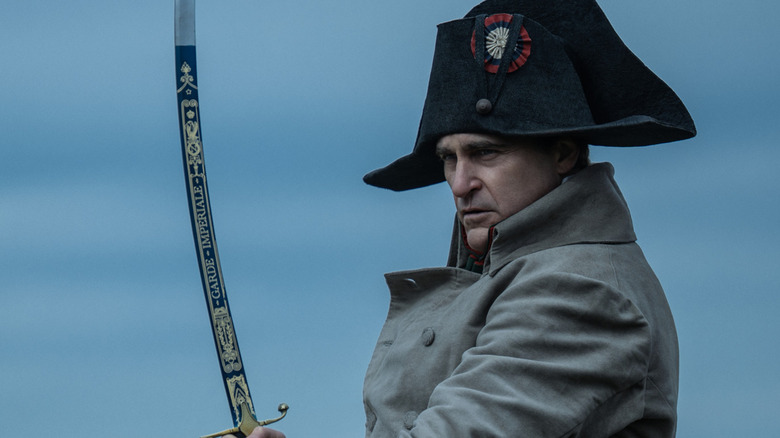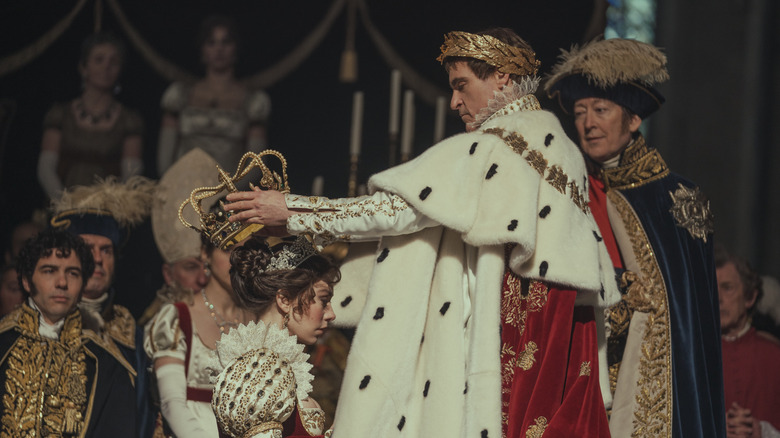Why Director Ridley Scott Didn't Rely On Books To Research Napoleon's Story
Director Ridley Scott has unleashed his latest movie on the world in the form of "Napoleon." It stars Joaquin Phoenix ("Joker," "Gladiator") as Napoleon Bonaparte, the famed French military leader who led the country to glory in the late 1700s and early 1800s before his exile and, ultimately, death. Scott has made it pretty clear that he wasn't overly concerned when it came to getting all of the historical details correct in the film. As a result, he didn't concern himself with reading a bunch of books about the man before making this sweeping historical epic/biopic.
Scott recently spoke with Deadline about "Napoleon," which is now in theaters before eventually making its way to Apple TV+. During the conversation, the Oscar-winning filmmaker behind "Alien" and "Gladiator" was asked what books he read about the French figure to prepare for the film. The short answer? He didn't. Instead, he was more interested in pictures. Here's what he had to say about it:
"There are 400 books on Napoleon. People say, which book do you read? I said, are you kidding? I as a child looked at pictures. When you look at [Jacques-Louis] David, some of the paintings done of Napoleon at the time. David was like taking a plate photograph nine feet tall of Napoleon and Josephine as they were ordained, you look at that in the cathedral, you see the audience and you can get a history lesson from the painting, right there."
That is, admittedly, an interesting approach. Do those paintings tell enough words to truly capture an accurate depiction of the man? Is Scott even concerned about being entirely accurate? Some details are always going to be omitted, such as Napoleon's battle with hemorrhoids, but the lines between truth and fiction can get blurry.
'You've got quite a lot of inaccuracy'
David Scarpa ("All the Money in the World") penned the screenplay for the film, and it isn't based on any particular book that has been written about Napoleon over the years, which is often the jumping-off point for a filmmaker when making a biopic. Ridley Scott further explained to Deadline that, at a certain point, the books become far less accurate, which seemed to deter him from feeling that they were necessary to tell the story cinematically:
"The 400 books are reports on report, on report. When probably only the original made sense, maybe written 15 years after Napoleon's death. The next book, say 10 years later, already is writing on the first book probably is being critical, therefore is adjusting and romancing the stone a little bit. So by the time you get to the 399th book, you've got quite a lot of inaccuracy."
The movie, as it exists, moves at a blistering pace and traces Napoleon's rise to power as well as his complicated love with his wife Josephine, played by Vanessa Kirby ("Mission: Impossible — Dead Reckoning"). Scott does have a much longer director's cut, which will eventually be released on Apple TV+, which might pad things a bit.
Will that help paint a more historically accurate picture? Maybe not. This does admittedly open up an interesting debate as to what responsibility — if any — a filmmaker has in getting a historical figure's story "right" when making a biopic. In fairness, we are talking about a man who died in 1821. There are bound to be inaccuracies. At some point, it's about trying to paint a portrait of the mythical figure history tells us about. Scott had his own way of going about that.
"Napoleon" is in theaters now.

